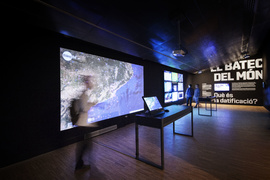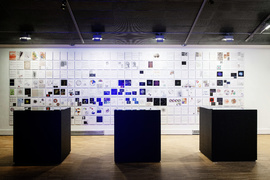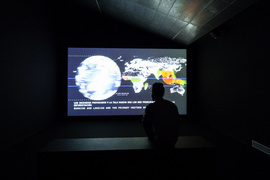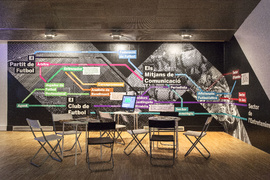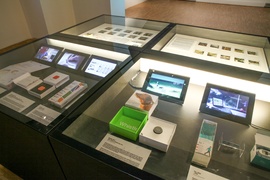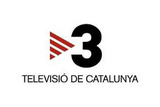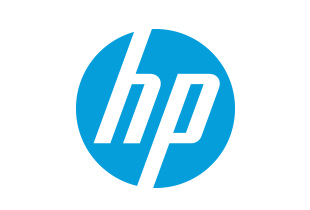Exhibition
Big Bang Data
Is data the new oil, a potentially boundless source of wealth? Is it the ammunition for arms of mass surveillance? Or should it be primarily an opportunity, an instrument for knowledge, prevention, efficiency and transparency, a tool to help construct a more transparent, participatory democracy?
"Big Bang Data" explores the phenomenon of the information explosion we are currently experiencing.The last five years have seen the emergence of a generalized awareness among academic and scientific sectors, government agencies, businesses and culture that generating, processing and above all interpreting data is radically transforming our society.
We all generate data, with our mobile phones, sensors, social networks, digital photographs and videos, purchase transactions and GPS signals. What is new is that it is increasingly easy to store and process these vast quantities of data that detect patterns (of incidents, behaviour, consumption, voting, investment, etc.). This fact is very quickly and completely changing the way decisions are made at all levels.
Taking part in the project are creators such as Christopher Baker, Chris Jordan, Ingo Gunther , Erik Kessels, David Bowen, Aaron Koblin, Eric Fischer, Near Future Laboratory, Bestiario, along with investigators, activists, designers, educators, analysts, cartographers, engineers, economists, architects, communicators, programmers, journalists and many others.
For this exhibition, the CCCB has produced the installation Internet Machine with the designer Timo Arnall, and the installation Sand Falls with the creative studio Domestic Data Streamers.
The CCCB has created a space for exhibition projects that bring an integrative approach to the culture of the 21st century and the far-reaching transformations of the digital age.
"Big Bang Data" is the first in this series of proposals to address the areas of friction that these changes are introducing in the fields of science, technological and social innovation, and political, economic and cultural challenges.
For the five months of "Big Bang Data", the expository space will also be a platform for meeting and debating this highly topical theme, with workshops, hackathons, education programmes and meetups for local and international communities.
"Anonymise Yourself-Electronic Self-Defence Handbook" offers a set of recommendations, tools, and practices to preserve privacy in the post-Snowden world.
Curators: Olga Subirós, José Luis de Vicente
THE WEIGHT OF THE CLOUD. Emerging geographies of data
The Cloud, the generic name for all the services that preserve our photos, e-mails, work documents and digital maps, is perhaps one of the most deceptive metaphors ever coined. Nothing light or intangible lies behind it.Our inexhaustible thirst of data has produced a major heavy industry, barely distinguishable from the factories of the mechanical age, along with a spider’s web of cables and electromagnetic waves that has wrapped itself around the entire planet. Maintaining our incessant pace of production and consumption of data and ensuring permanent accessibility to it has an energetic impact that can no longer be considered as insignificant.
IMMERSED IN THE TSUNAMI. A history of the information explosion
The idea that we are living after the shock wave of a major information explosion is not new. Even so, the quantity of data that we are capable of producing, transmitting, and storing has grown at an unprecedented rate. Fifty years ago, a hard disk was an enormous device, about the size of a small family car, and it stored the equivalent of a single song in MP3 format, a ridiculous fraction of the capacity of the smartphones that we carry in our pockets today.
As our personal experience and our collective history are increasingly encoded in digital formats, the problem of their preservation in the long term becomes more urgent.
MORE IS DIFFERENT. The science of Big Data
Having access to more data is not just a question of volume; above a certain threshold, it is possible to do things differently. The immense masses of information produced by scientific, business, and governmental organisations contain great pools of valuable knowledge that can be captured if we learn to detect them, extract them, and read them. The Big Data revolution has brought with it a set of methodologies and techniques for information analysis and management, as well as emerging professions: from the data scientist to the data analyst and expert in information visualisation.
THE WORLD’S PULSE. What is datafication?
The ease of storing large volumes of information at low cost comes hand in hand with another determining factor: ease in producing this information, thanks to the millions of sensors flooding the world. From GPS receivers that monitor goods and passenger transport to those measuring air quality in cities, the traffic on the roads and the functioning of assembly lines, for example.This infrastructure is now essential for major global systems to work, but it also offers a new narrative, in real time, of urban, social, and economic mechanics.
VISUALISING COMPLEXITY. Explaining the world with data
With the birth of modern statistics, in the mid 19th century, as a discipline capable of explaining different social, scientific, and economic phenomena, the need emerged to forge a new language that would overcome the distance between the quantitative measurement of reality and our need to understand the world with narrations. The practise of transforming numbers into images to tell a story has a long tradition in science and design, that spans from the figurative maps of the 19th century to today’s data visualisations. In the second half of the 20th century, artists from different spheres started to create an information aesthetic, in which data became an instrument for representation and subjective exploration.
WHAT ARE YOU THINKING, WHAT ARE YOU DOING, WHAT ARE YOU FEELING. The social production of data
Until a decade ago, the great majority of data produced in the world were the result of scientific, industrial, and administrative mechanics. But the explosion of mobile technologies and the popularisation of Web 2.0 social services have radically changed this: today the main agent in the data explosion is the everyday activity of millions of citizens. Whether making searches on Google, uploading videos to YouTube, updating Twitter or accepting friend requests on Facebook, our actions produce digital footprints which capture our desires, fears and hopes. For this reason, techniques are currently being used such as “sentiment analysis” to try to determine our collective preferences when it comes to purchasing a product, or expressing an opinion on a political decision.
A NEW ERA OF KNOWLEDGE. The revolution of disciplines after Big Data
From professional football and literary studies to crime prevention, today the fields of knowledge that have been profoundly changed by access to big data sets are countless. Data science methodologies are opening up new paths in numerous disciplines creating specialised fields that are associated with new professional profiles.Thus, today, in urban planning, we talk of smart city technologies; in the press, of data journalism, and in departments of history, of digital humanities.The first wave of data-driven products is also generating tensions and rifts in the respective industries, as is happening with the highly controversial personalised genome analysis services.
WE ARE DATA. From quantification to commodification of “the self”
The need to measure everything we do, as a form of self-knowledge, has a long history, but what was once viewed as an extreme obsession is now an everyday practice and a growing economic sector.The promise of the Quantified Self movement is that registering each of our acts is the best way of understanding their consequences and achieving any goal. This is one of the many industries that, through data, have started to commodify our privacy.
Today we are not just data consumers. Online social platforms build up an extremely detailed profile of our preferences, turning us into a product. Our data is the merchandise that data brokers buy and sell, and an essential component in the economic model of the the Internet. This systematic gathering of data on our personal lives is one of the factors that make possible the mass surveillance state revealed by Edward Snowden leaks.
WHAT DATA CAN’T TELL. The tyranny of data-centrism
Putting data culture at the centre of decision-making and of our way of interpreting the world opens up many possibilities, but also involves numerous risks. The main danger of data-centrism is that it encourages the idea that whatever the problem, the answer lies in data, and that our society can do without more disordered and imperfect mechanisms based on politics and negotiation. Preserving values such as subjectivity and ambiguity is especially important at a time when it is easy to believe that all solutions are computable, and that they are hosted on a server and stored in a Data Centre.
DATA FOR THE COMMON GOOD. Towards a critical and participatory culture
Citizens today have a fundamental role to play in determining what kind of data society we will live in. They can resign themselves to being passive consumers and merchandise in the hands of those who exploit their information, or exercise their right to access the data that belongs to everyone and use it.Thousands of administrations worldwide have promoted open data policies to improve their levels of transparency and encourage citizeninnovation, with varying degrees of success. Furthermore, today the public is producing its own data. Different collaborative platforms make new forms of science possible, and allow us to be participants in collective experiments.
Related contents
Interview with Olga Subirós and José Luis de Vicente
curators of "Big Bang Data"
Olga Subirós and José Luis de Vicente, curators of the CCCB project "Big Bang Data" explain what "big data" is and how the proliferation of data in social, academic, scientific, political or cultural fields affects our lives.
Big Bang Data. Virtual view
“Big Bang Data” explores the phenomenon of the information explosion we are currently experiencing. The last five years have seen the emergence of a generalized awareness among academic and scientific sectors, government agencies, businesses and culture that generating, processing ...








